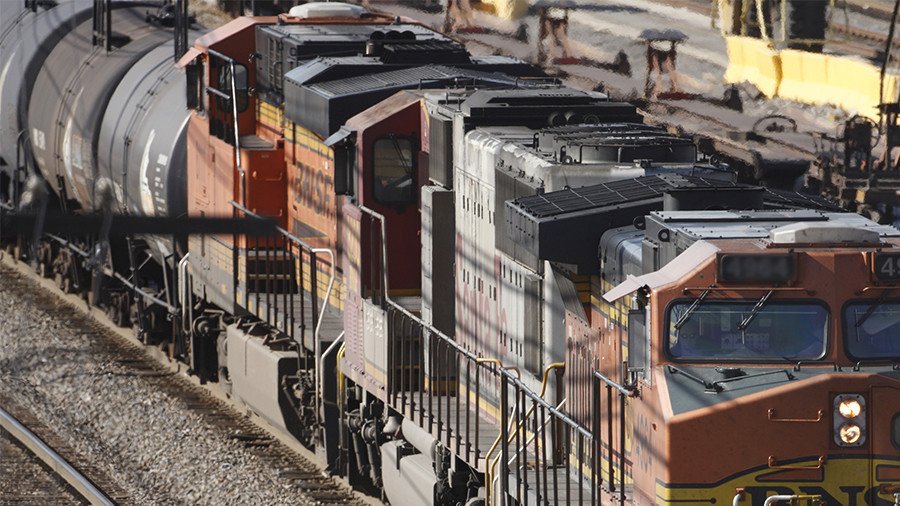‘David and Goliath situation’: How New York City poop became a rural Alabama town’s problem

The unbearable stench of some 150 rail cars filled with human waste has pushed a small town in rural Alabama into the international spotlight. It turns out the toxic sludge came from New York City, over 1,000 miles away.
Since January, freight cars filled with human waste and other “sludge” from New York City and nearby New Jersey have been piling up at the rail yard in Parrish, Alabama, about half an hour’s drive northwest of Birmingham. The town of less than 1,000 residents has been overwhelmed by the stench.
“It smells like dead bodies,” one resident told WVTM, a Birmingham-based CNN affiliate, in mid-March. Other locals compared the smell to rotting animals.
“It greatly reduces the quality of life,” Mayor Heather Hall told CNN. “You can’t sit out on your porch. Kids can’t go outside and play, and God help us if it gets hot and this material is still out here.”
The rail yard is “right next door to our softball and baseball fields and right across the street from houses," Hall told Canadian radio. “It's a very small town.”
Train hauling 10M pounds of human feces stranded in Walker County town: ‘God help us if it gets hot’ https://t.co/neGqqvqTwEpic.twitter.com/ZoLjtrEer2
— WHNT (@whnt) April 5, 2018
Parrish sprung up around the railroad, built to service the area’s coal mines. The small community celebrates a “Coal Fest” every April. Since January, however, having a large rail yard has turned into a curse for the town.
Since April 2017, Big Sky Environmental, a private landfill in nearby Adamsville, has had a contract to dispose of sludge brought in from New York by train. As there is a daily limit to how much can be dumped, the excess rail cars were stored near the town of West Jefferson – until the local authorities filed an injunction against Big Sky in January.
The nearest suitable rail yard turned out to be in Parrish. The cars came, and “kept coming and coming and coming,” Hall said. At one point, there were 252 containers filled with waste at the railway yard. That has since been reduced to 150, but it might take weeks to get rid of all of them.
“The one saving grace we have right now is because it has been so cold," Hall said. But spring is coming.
Some 1,000 miles northeast is New York City, with 8.5 million inhabitants who produce almost 1,200 tons of “biosolids” every day, according to the city authorities. Biosolids are defined as “solid organic matter recovered from the sewage treatment process.” Some of it gets used as fertilizer, but the rest is sent to landfills such as the one owned by Big Sky in rural Alabama.
When Hall complained to state and federal officials, they told her the waste posed no health hazard for the residents of Parrish. She feels like her poor, rural community is being taken advantage of by Big Sky and New York City alike.
“It's a bit of a David and Goliath situation that we have,” she told the CBC.
One would think such a story would inspire solidarity among those Americans critical of big corporations and standing up for the little guy. No such luck.
Hey I just saw this. Are you or Eric missing something?https://t.co/UK5cApy10P
— The Adjunct Crayon (@Adjunctcrayon) April 4, 2018
Wasn't aware of trains carrying loads of human waste.But it'd be hard to find a better final destination than Alabama.
— Brian Hjelle🇵🇷🇳🇴🇺🇸🇬🇧 (@Brian_Hjelle) April 5, 2018
Over 75% of the residents of Parrish, Alabama, who now have 5,000 tons of sewage rotting in their backyards, are registered Republicans.How's that whole "voting for environmental deregulation to own the libs" thing going, folks. Pretty great, right.
— Take That Darwin (@TakeThatDarwin) April 5, 2018
A train holding 10M pounds of human feces is stranded in Parrish, Alabama. 72% of the county voted for Roy Moore so it seems quite fitting. 😂
— Carlos (@blazingxmexican) April 5, 2018
Many coastal liberals consider Alabama a “deep red” state that voted for President Donald Trump in 2016, and therefore deserves being drowned in New York City excrement. When the story of Parrish’s poop problems made headlines, they were all too happy to mock the troubled town on Twitter.
RT has reached out to Big Sky for comment.
Think your friends would be interested? Share this story!














